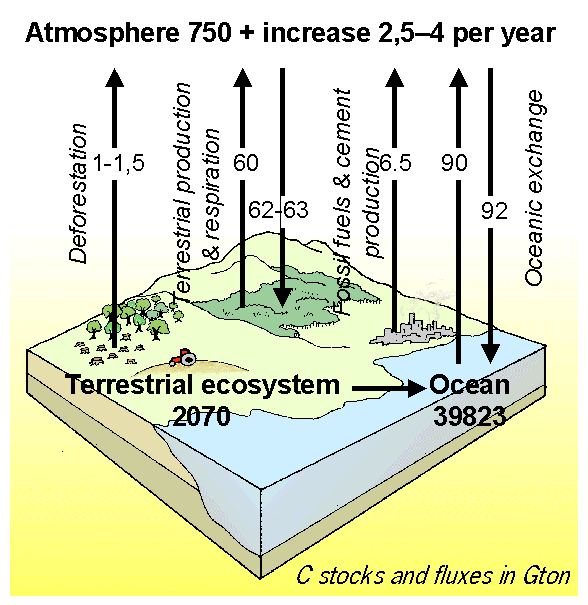|
Researchers of CCB Wageningin-UR are involved in the masters Earth Systems Sccience (MEA) and the masters Environmental sciences (MES) The course Global Change (ESA-30804), is coordinated by CCB Wageningen-UR and is designed for both master programmes. CCB education views the Earth as a synergistic system of interrelated phenomena which is governed by complex processes involving the biosphere, geosphere, hydrosphere and atmosphere. By building on the traditional disciplines for studying the Earth, the system approach has become widely accepted as a framework from which to pose monodisciplinary and interdisciplinary questions in relationship to humankind (such as global change issues). Education in CCB-research context reflects world-wide concern about the state of the environment and the need to find sustainable solutions to the threats facing the environment. It provides insight into the socio-economic causes, the nature and the consequences of global change and their effects on human beings, other organisms and ecosystems. It aims to generate technology as well as socio-political and economic instruments to mitigate and to adapt to global change in an interdisciplinary way. Research of the Climate change and Biosphere Programme is implemented within several educational programmes of WIMEK,SENSE and PE& RC.
|
|
MSC Thesis on Global and Climate Change
In a global change thesis you may study:
More information?
Dr Ir Marcel R. Hoosbeek
Some examples of possible thesis subjects
TO BE EXTENDED
Students will learn how scientific research can contribute to a better understanding of the
causes and effects of Global Change (climate change, land use and cover change) and the
possible solutions. To this end, lectures and guest-lecturers will provide the latest
expert knowledge about Global Change issues. Also the interactions between science and
policy making will be discussed. Attention will be paid to the Climate Change and Biodiversity
Program (CCB) of Wageningen University and Research Center. The issue is approached from
multi-disciplinary perspective to enhance the integration of knowledge of disciplines like
environmental sciences, ecology, economy and agriculture.
Next to climate change, this course will also aim at understanding, analysing and
modelling Land Use Cover Change (LUCC) and its effects. Students will start with a
problem-oriented study on the underlying causes (socio-economic and biophysical)
of land use change by means of a set of case studies from various regions in the world
varying from continental to local scales. Subsequently the students will receive for
each case study a combined spatial explicit socio-economic-biophysical data set, which
they will analyse by means of empirical methods. The students will use the CLUE
(Conversion of Land Use and its Effects) model. Scenarios will be formulated with
an emphasis on socio-economic, population, global change and a natural catastrophe.
Examinators
Prof.dr Pavel Kabat, Prof.Dr.Tom Veldkamp, dr Carolien Kroeze, dr Dolf de Groot
Contact:
Dr R.S. de Groot
IN CONSTRUCTION
Contribution to English MSc.
programs and PHD education
Doing a thesis on global change
Courses with CCB contributions
![]() the working of the climate system and the main causes of climate change
the working of the climate system and the main causes of climate change
![]() Assessing uncertainties in predictions and related expected
impacts on natural systems (water, soils, air and ecosystems) and human activities (transport, insurance,
energy supply, food and fibre production)
Assessing uncertainties in predictions and related expected
impacts on natural systems (water, soils, air and ecosystems) and human activities (transport, insurance,
energy supply, food and fibre production)
![]() Policy implications and the possibilities of application of policy measures to reduce
the greenhouse effect (mitigation) and to minimalise the possible damage of climate change
(adaptation).
Policy implications and the possibilities of application of policy measures to reduce
the greenhouse effect (mitigation) and to minimalise the possible damage of climate change
(adaptation).
![]() unknown and complex feedback-mechanisms
between climate, biosphere and human society (Integrated Assessment)
unknown and complex feedback-mechanisms
between climate, biosphere and human society (Integrated Assessment)
![]() the effects of land use and cover
change (such as deforestation) on the global hydrological cycle
the effects of land use and cover
change (such as deforestation) on the global hydrological cycle
![]() Participartory processes, like new approaches for
using models and scenarios in Participative Integrated Assessment, including dialogues between scientists,
decision-makers and stakeholders
Participartory processes, like new approaches for
using models and scenarios in Participative Integrated Assessment, including dialogues between scientists,
decision-makers and stakeholders
Tel.: 0317-(4)84109
Email: marcel.hoosbeek@wur.nl
More info: Arnold van Vliet
Tel.: 0317-(4)82247
Email: dolf.degroot@wur.nl
![]()
Updated 01.05.2003 by Jeroen Veraart jeroen.veraart@wur.nl
![]()
